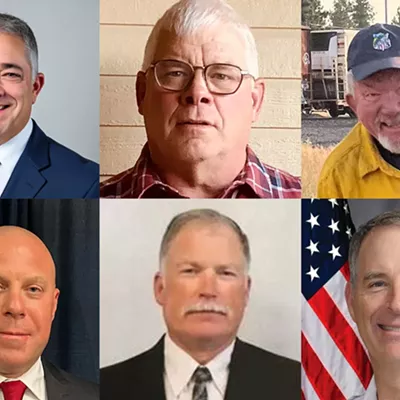Tillman Carr, owner of the Cheney Liquor Store, sold alcohol under the state’s monopoly for 10 years through a private contract. Now he shares a building with his largest competitor, Safeway, and his sales have plummeted.
Customers that once ducked into his store while buying groceries now pass him by. Carr says he has lost thousands of dollars in revenue each month. He has scrounged money from his retirement savings to maintain inventory and dropped one employee.
“We’ve had to skinny down our [profit] margins,” he says from his store off First Street. “And I’m spending more time here.”
Carr recently joined 10 other contract liquor store owners across the state in a more than $7.5 million lawsuit against the state Liquor Control Board and the Department of Revenue. The lawsuit, filed last week in Thurston County, alleges the state did not meet clearly-defined obligations to help contract stores make the transition to a privatized liquor market.
“They’re supposed to do things to help us out, to help us stay in business,” he says. “They dropped the ball.”
Spokane attorney Kevin Roberts, with Dunn & Black, argues Carr and many other private contract stores — separate from state-operated stores — had several years left on their agreements with the state. Many owners counted on those guaranteed years to recoup investments in their stores and other personal expenses. Now they’re facing multiple disadvantages in a much more competitive market.
Roberts says Initiative 1183, which privatized liquor sales on June 1, required the state to help contract store owners avert heavy losses. It also called for the Department of Revenue to develop a process for owners to file claims on losses stemming from the transition.
“The state has simply not done anything in that regard,” he says.
The state Attorney General’s Office has issued a preliminary response to the complaint, arguing nothing in the new liquor laws requires the state to monetarily compensate contract store owners for their losses. Assistant Attorney General Mary Tennyson says in a letter to Dunn & Black that the owners are not guaranteed any payment for their unexpired contracts.
“While we acknowledge the specific language in these sections to which you draw our attention,” she writes, “we do not interpret the language as justification for compensatory payments to contract liquor stores for the termination of their contracts.”
Chris Marr, a former state senator from Spokane now serving on the Liquor Control Board, says the board took several steps to help contract stores transition. For instance, contract owners did not have to pay for new rights to their stores and the board also helped coordinate inventory distribution and location approvals.
“What we tried to do was make it as easy as possible,” he says. “We’ve kind of gone out of our way, I think.”
Marr points out the store owners’ contracts included clauses that allowed for termination if state legislation changed. He explains the board was forced to balance a wide variety of interests throughout the transition, but tried to do whatever it legally could to assist contract owners.
Another major complaint hinges on a 17 percent tax charged on liquor sales to bars and restaurants. Store owners argue they were promised the tax would not apply to their sales, giving them an advantage to sell to those businesses. Carr says a legal interpretation of the liquor initiative forced the board to impose that tax on all retail sales.
The Liquor Control Board acknowledges it has received several complaints from contract owners, including Carr and others listed in the lawsuit. Marr says some aspects of the liquor privatization, which has an immense economic impact statewide, may have to be sorted out in court.
“They’ve raised some issues,” he says.
Contract owners across the state, from Grant to Jefferson counties, have signed on to the new lawsuit. Roberts says he expects additional owners to join the suit in the coming weeks, arguing all of the provisions included in I-1183 to protect small businesses have been ignored.
“Our position is the liquor board is not carrying out the will of the people,” Carr says. “The will of the people is laid out there. It doesn’t need any interpretation.”
















